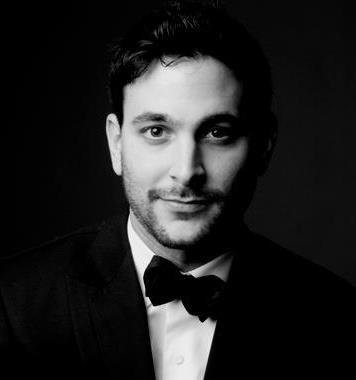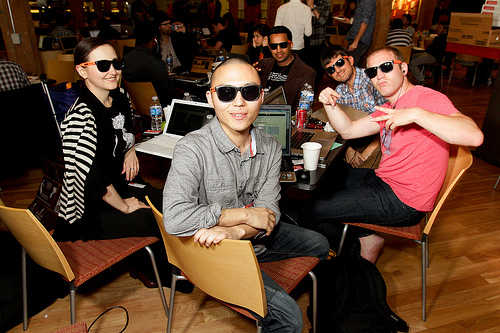What Is the AngelHack Mentality? Inside the Mind of the First AngelHacker, Greg Gopman
In his t-shirt and jeans, Greg Gopman, the founder of AngelHack, looks like any other hacker / programmer, guy trying to make his way in the world of Silicon Sunsets and Sand Hill dreams. But a soon-to-be global series of hackathons led Microsoft BizSpark's Douglas Crets to sit down with the man and figure out what led him to this obsession with putting the hack back into the hackathon?
At the end of the day, what is the hack? We talk with Greg Gopman and find out. Our interview ranged over several subject areas, because I was really trying to get into the mindset of a guy who is seemingly obsessive-compulsive about biulding great code and extraordinary hacks over 36 hours in locations like AOL's Palo Alto headquarters, or the Microsoft Silicon Valley Center. What drives the guy? How do they know they are winning in their market? Is a hackathon a business? Why do it? What do companies get out of it, if they are sponsoring the event? What do they get out of the hacks?
If you have any follow up questions, leave them in the comments, and we will certainly drive the conversation forward.
Greg Gopman, courtesy of his Facebook profile
What have you learned about managing a technological business that you would pass on to the next generation?
Greg: Since moving to Silicon Valley I’ve learned that almost none of these great stratups got things right the first time around. The Facebooks and iPhones of the world are few and far between; making up less then 1% of the great tech we use everyday. What this means is you're more then likely going to get things wrong when you start, but the important thing is TO START and build in good analytics, so you can iterate fast as your market tells you what you need. For my company, that meant changing from a boys fallacy that he could help people build startups in 3-days to a now 8-week program spanning the globe combining startups with mentorship, travel, and the opportunity of winning funding.
What was the most difficult challenge your business faced this year?
Greg: Everything was a challenge this year, because we’re less than a year old J. AngelHack Events organizes the largest offline coding competitions (aka, hackathons) in the world, which connect the 3 major communities of the startup ecosystem – developers, angel investors, and startups. We essentially throw mini developer conferences in every city. The top problem we’ve faced is figuring out how to scale up the business from San Francisco into other major tech hubs, where we don’t have relationships yet. It’s hard to hire dedicated people (most of the good ones are heads down working on their own ***) and understand the best developer marketing channels for each city. Luckily, through a lot of trial and error we’ve been successful at putting systems in place that work in most cities. I also visit each city to form relationships with community leaders and get a feel for what drives events in those cites. Though there are competing events happening every week, AngelHack is now the largest hackathon in San Francisco, Seattle, New York, and Boston, and we’re expanding to Los Angeles, Washington DC, Toronto, Paris, London, and Tel Aviv this November/December.
How do you know when you are failing in product development and how do you make a correction – do you make the decision on your own, or do you consult your team?
Greg: I look at metrics to know how we’re doing – event attendance, attendee surveys, and how the startups created through the AngelHack experience are doing when the dust settles. Everything is a constant work in progress and I consult my team (and advisors) at all steps along the way. If we’re doing things right, the communities love us, startups are solving problems, and investors are finding good dealflow. If all three of these things aren’t happening, then I tweak things like marketing channels (event attendance), event programming (feedback), and length of mentorship (startup success rates) as needed.
What signals from your consumers do you look for to signify that you are winning?
Greg: My customers are the sponsors that want to support developer/startup communities around the world. Without them we wouldn’t be able to subsidize event costs and provide adequate value to our community (AngelHack provides attendees with 5 gourmet meals, snack, drinks, massages, shirts, toys, and all expensed paid trips to Silicon Valley for the 2-3 winners/city). When the sponsors are happy to support our event then we (and our community) are winning!
When you need to ask questions on your team, who do you go to? Who do you usually turn to outside of your organization to ask questions?
Greg: I turn to my best friends -- a developer/designer, a community organizer, and a wordsmith. They're my rock. Now that our startups are getting funded (6 of 25 finalists from AngelHack S’12), I find myself talking to investors more and more to get their feedback. My favorite is when I sit down with an investor who came from the startup world like NYC’s Owen Davis or AngelPad’s Thomas Korte, because they understand both sides of the game.
Who would you like to be your mentor, and what would you ask him or her?
Greg: Fred Wilson (NYC) seems to be leading the pack of Angel Investors these days. Most of what he touches turns to gold. The same could be said of Ron Conway (SF), but these days the activity comes mostly from his group of wildcats at SV Angels. If any of them wanted to show support I would simply ask them what we could do to add value to our community and ensure we’re on the right track. As is, we provide startup docs, media attention, design help, group trips, recruiting services, weeks of mentorship, and a platform to get six-figure funding.
Who is your mentor, and what was the last great thing he or she told you and your team?
Greg: This is going to sound awful, but I follow a lot of Dave McClure’s teachings (500 startups). He’s one of the most outspoken and polarizing people in the startup community, but there’s a lot of wisdom in the things he says. If you synthesize his information properly, then you’ll have a blueprint for success in angel investing (spray and pray). Even renowned investors like Google Ventures’s Joe Kraus (founder of Excite.com) will tell you that no one knows what they’re doing in early stage investing—Dave is just the first one to embrace that whole-heartedly. My team takes a page from that book, adds a competitive angle to it, and supports top teams in anyway we can to ensure their success.
Jeff Tennanbaum from Blue Run Ventures has been really supportive keep my head down and keep crushing it and we’d have a 1m business in a year. Thomas Korte from AngelPad (#4 on Forbes incubator list) has been a great advisor also. I’ve had some great chats with Boston’s David Beisel also.
What has overjoyed you in the past month?
Greg: VegasTech (the investment arm of Zappos founder Tony Hsieh) flew our top hackathon teams out to Vegas last week to see their Downtown Vegas redevelopment program and recruit our teams to move there. It was an amazing experience and a great chance to bond with our AngelHack winners. While there, we also met some agency people who told us their brands would flip head over heels to be part of what we’re doing and support our global entrepreneurship initiative. I asked them what we’d have to provide them in return and they said “nothing…we just want to help you and your community succeed.” That was pretty rad.
What does something in your business vertical need in order for the product to be successful?
Greg: We need more support from the investment community in mentoring our teams. As we expand across the globe we’ll be looking for local angel investors to mentor/guide and potentially invest in our top teams as they begin their startup journey. That is our priority right now.
How does your company utilize next generation marketing techniques?
Greg: This is going to sound passe, but for us having a strong twitter presence was crucial to taking things to the next level (@AngelHack #AngelHack). It took us 6 months to find a team member who could manage our account well, but once we found her things got pretty awesome, pretty fast. Our last event only had around 1,000 attendees, but almost everyone I meet has heard about AngelHack since there was so much activity on Twitter. At one point we were a trending topic, which was pretty rad.
Has starting your own company provided any answers about your life?
AngelHack is my fourth company, but my first Silicon Valley venture. Starting a company in the Valley teaches you how to focus on community and what it looks like to work around great people. It also provides you with the best entrepreneurial mentors in the world – bar none! Combined, you have no excuse to not succeed here except for your own shortcomings (and luck—all startups are 50% luck). What I’ve learned with AngelHack is that I wasn’t a failure because my previous businesses didn’t succeed, only a failure in seeking out great mentors, opportunities, and the right community of people.
Have you discovered something about yourself that you didn’t know before?
From pushing myself to succeed I’ve learned my second gear – the tear through walls, act now, don’t hesitate mentality that once you get going will give you the confidence to tackle anything. One of the nicest feelings in life is knowing you have the power to get things done and FAST! The key for me was to stop worrying about getting things done right and just focus on getting them done. The quality of work will increase over time as your brain gets used to moving so fast. Too often we give ourselves excuses to slow us down – overcoming the bullshit is what makes great leaders and in tech – great founders.

